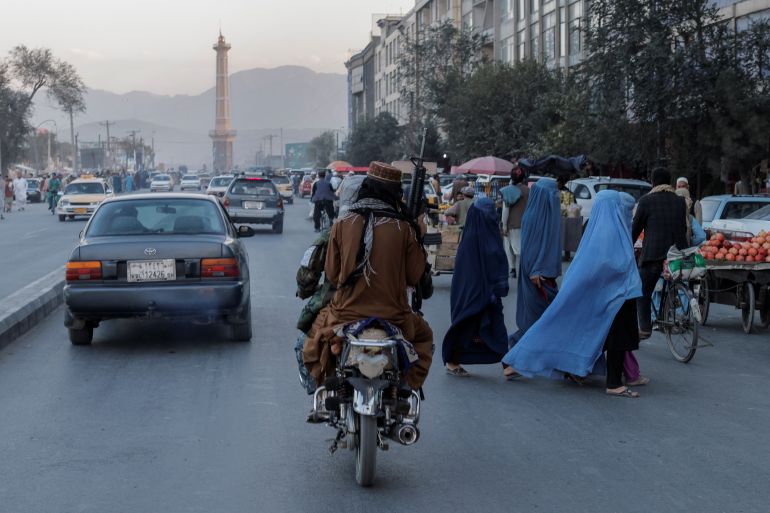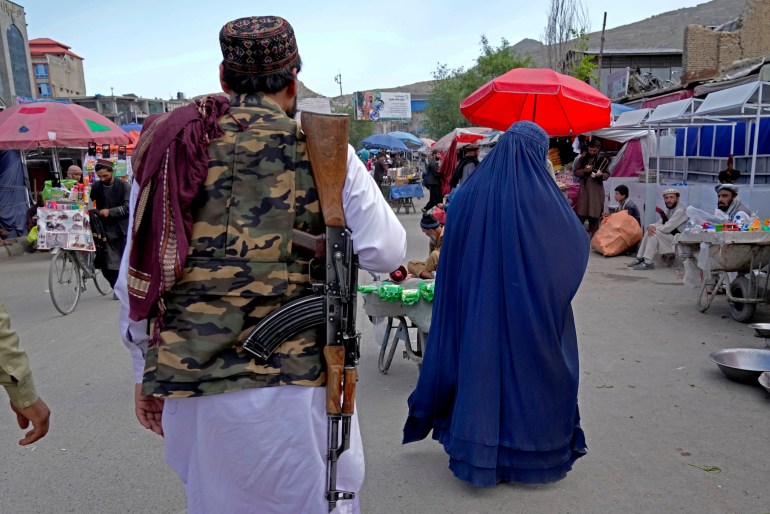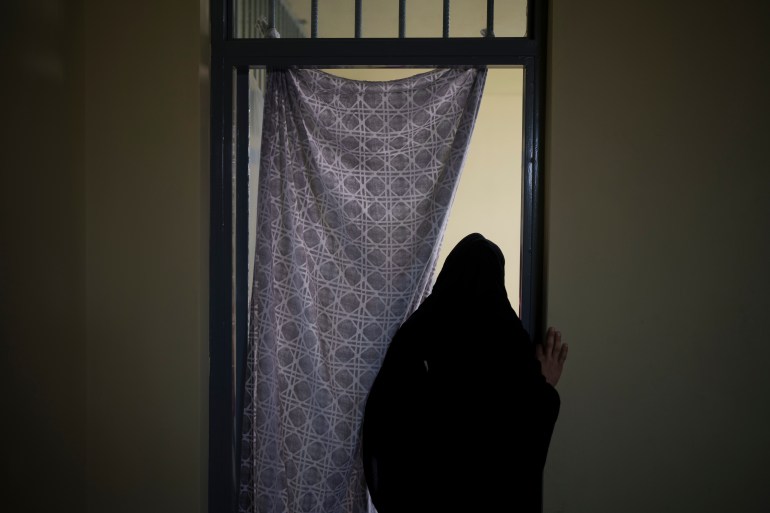Return of Afghan floggings as Taliban takes a hardline path
Taliban denounces criticism of public floggings and execution, bringing back memories of its harsh rule in 1990s.

In early November, Sadaf*, a 22-year-old university student, was found guilty of “moral crimes” in a northern Afghan province. She was accused by local Taliban officials of speaking to a man who was not her “mahram” – a male family member.
Since seizing control of Afghanistan in August 2021, the Taliban have imposed increasing restrictions on women, including gender segregation at universities and public places such as gyms.
Keep reading
list of 4 itemsAfghan women barred from gyms, Taliban official says
‘Life is hell for Afghan women once again’
The Taliban’s Afghanistan
Sadaf said her entire family could not sleep that night, laying awake, praying anxiously over the uncertain fate she faced.
“We didn’t know what my punishment would be, and everyone feared that they might kill me,” Sadaf told Al Jazeera.
“I feared they would kill my family too. My mother prayed that the matter would be settled with just whipping,” she said.
The Taliban have been inviting large crowds to public grounds and stadiums to hold public spectacles of punishments such as flogging. On Wednesday, a man was publicly executed in Farah province.
“I estimate that up to 80 people have been whipped since we took over Afghanistan,” Abdul Rahim Rashid, head of press relations at the Afghan Supreme Court, told Al Jazeera.
“Men and women have been whipped for different crimes in Kabul, Logar, Laghman, Bamyan, Takhar and some other provinces,” he added.
The reports of public punishments in recent weeks have brought back memories of the Taliban’s harsh rule in the 1990s when convicts were publicly stoned and beheaded.
The Taliban initially promised women’s rights and media freedom but more than 15 months on, Afghanistan’s new rulers have gone back on these promises. High schools for girls remain shut, women have been squeezed out of public places, and free media is almost non-existent.

The United Nations human rights office said the execution in Farah, the first public execution since the Taliban returned to power, was “disturbing” and called for “an immediate moratorium on any further executions”.
But international pressure does not seem to have made the Taliban budge.
The Taliban’s spokesman, Zabihullah Mujahid, tweeted on Thursday the international criticism shows outsiders “do not respect the beliefs, laws and internal issues of Muslims, which is an interference in the internal affairs of countries and is condemned.
“Afghanistan is an Islamic country … they have sacrificed a lot for the implementation of Islamic laws and system,” said Mujahid.
In a public statement issued on November 14, Haibatullah Akhunzada, the Taliban’s supreme leader, ordered judges to fully enforce aspects of the group’s hardline interpretation of Islamic law, which includes public executions, stoning, flogging, and amputation of limbs.
‘Framed’
Sadaf, a student of Islamic law, alleged she was wrongly accused and denied a fair trial. The name of her university is not being published for security reasons.
“About a month ago, I was stopped by a local Taliban leader while returning from the university. He wanted to know why I had rejected his son’s marriage proposal,” Sadaf said, adding the same man had approached her father several times before.
“But we rejected them every time because I did not want to marry a Talib [Taliban member],” she said.
“I told him I know what a woman’s rights are in Islam, so if I don’t want to marry your son, no one can force me to do so. This made him very angry and he started calling me insulting names.”
The 22-year-old accused the Taliban leader of framing her for talking to a man she was not related to, which is punishable by the Taliban as a moral crime. “He told them [judges] that he saw me talking to the non-mahram; he was referring to the taxi driver that I had just got off from.”
Rashid, the head of press relations of the Supreme Court, denied the accusations, saying no decision by the courts was made without evidence.
“The courts study the case files, the accused is brought to the court of appeal, and only after a confession is taken, or the witnesses are presented that a judgement is passed,” he said.
Sadaf said her neighbours tried to convince the Talib to let her go but it was in vain. A local Taliban official later informed her father that she had been found guilty. She was not represented by a lawyer and the verdict was announced in her absence.
“They [Taliban judges] said I would be forgiven if I married Talib’s son but I refused. I would rather die than marry him.
“My mother tried to convince me but my father stood by me, saying ‘it’s better my daughter dies once than die every day’.”
‘Legitimacy of such trials’
The night before the punishment was to be implemented, Sadaf’s family recited the Quran and prayed for her safety.
“I hugged my siblings, kissed my mother and asked for her forgiveness. And I told my father if something happened to me to stay strong and leave this province,” Sadaf said before leaving for a local mosque.
Her neighbours, the Taliban leaders, including the one who levelled the accusation against her, had gathered for the punishment. She was ordered to be flogged publicly.
“They stood in a circle around me. My hands were tied and I was told not to scream because men should not hear women’s voices. And then I was whipped, as my father stood in front of me begging for the Talib to forgive me, apologising to them for a crime I did not commit,” she said.
Sadaf was whipped about 30 times before she passed out. She does not remember how she was moved to her home.
Human rights organisations are raising concerns over increasing incidences of public lashings and other brutal punishments across Afghanistan.
“The public flogging of women and men is a cruel and shocking return to out-and-out hardline practices by the Taliban. It violates the absolute prohibition of torture and other ill-treatment under international law and should not be carried out under any circumstances,” Samira Hamidi, an Afghan activist and Amnesty International’s South Asia campaigner, told Al Jazeera.
The UN has raised concerns over the trials where an accused is often arrested, tried, sentenced and punished, all on the same day. Hamidi said it also raised questions about the legitimacy of such trials, conducted in the absence of a functioning justice system.
“The lack of remedies to those arrested – such as access to lawyers, formal legal mechanisms, and court trials – has enabled the Taliban to reimpose their notorious justice using their interpretation of Islamic law, or shariah, as a tool.
“Thus, the legitimacy of such degrading and inhumane practices is out of the question and the use of violence and ill-treatment is not justifiable.”

‘Deeply patriarchal society’
For women in a deeply patriarchal society such as Afghanistan, such punishments can have an effect much more profound than the lashing itself. “Being a woman flogged in public is, culturally, a direct threat to their lives as well,” Hamidi said.
“These women stand to not just lose social respect but are also vulnerable to domestic violence and mistreatment from their families. They will be judged, dismissed and can even lose their lives for bringing shame to their family and society,” she said.
Cases such as Sadaf’s highlight the extent to which women’s rights have steadily deteriorated in Afghanistan. Women continue to lose access to the legal, political and social rights they had secured over the last 20 years since the Taliban was overthrown in 2001.
Richard Bennett, the UN’s special rapporteur on Afghanistan, called it “the worst country in the world to be a woman or a girl”, while presenting his findings to the General Assembly committee in October.
In Sadaf’s case, the lashings were far from the end of her ordeal. Her family continued to face pressure from the Taliban leader to marry her to his son.
“My father bought us some time. He told Talib that he would arrange the marriage but asked to wait a couple of weeks for the wounds on my body to heal. In that time, he arranged for our escape,” she said.
With the help of friends, her family escaped in a car, in the dead of the night, to a different province, where they remain in hiding, facing an uncertain future.
“We don’t know for how long we can remain on the run, but we have to find an escape. Afghanistan has become a big prison where the Taliban can inflict any punishment on you without reason,” Sadaf said from her hiding place inside Afghanistan.
*Sadaf’s name has been changed due to concerns over possible reprisals